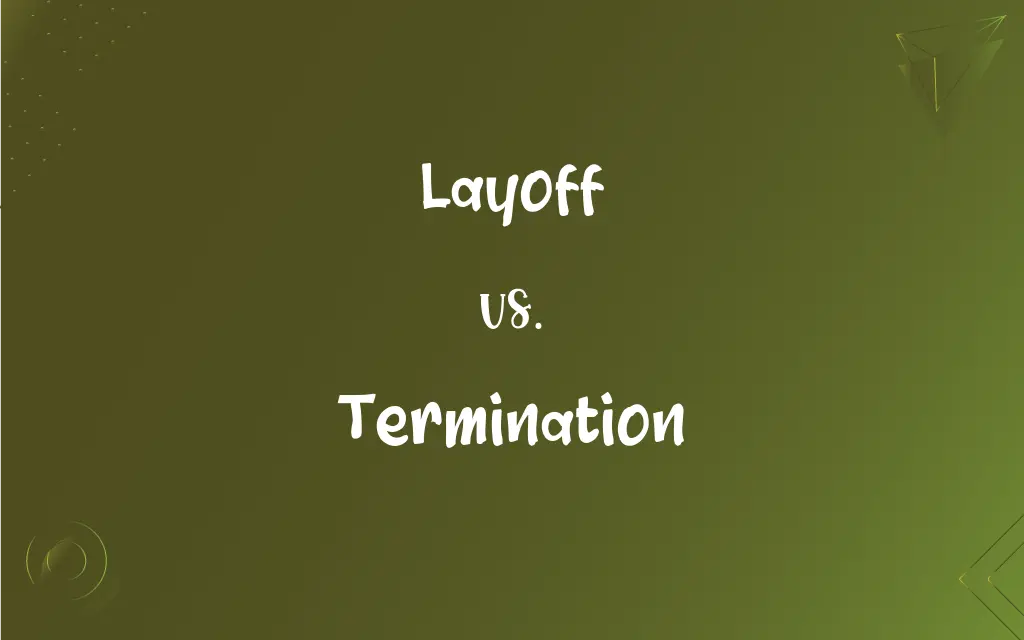Layoff vs. Termination: What's the Difference?
Edited by Janet White || By Harlon Moss || Published on December 1, 2023
"Layoff is a temporary or permanent dismissal of employees due to business reasons; termination is the end of an employee's contract due to performance or misconduct."

Key Differences
Layoff often implies a temporary or permanent dismissal of employees due to economic or business reasons, not necessarily related to individual performance. Termination, on the other hand, is the end of an employee's job due to reasons like poor performance or misconduct.
In a layoff, employees might be rehired if the company's situation improves. Termination usually means the employee's relationship with the company is permanently severed.
Layoffs can affect multiple employees, often as a result of downsizing, mergers, or business restructuring. Termination is typically an individual matter, focusing on the specific employee's actions or capabilities.
Layoff is not typically a reflection of the employee's abilities or work performance. In contrast, termination often results from an employee failing to meet job standards or violating company policies.
Employees laid off may receive severance packages or unemployment benefits. In termination cases, especially for misconduct, severance or benefits might not be offered.
ADVERTISEMENT
Comparison Chart
Reason
Business reasons like downsizing, not performance-based
Performance issues, policy violation
Individual or Group Impact
Can affect groups of employees
Usually individual
Potential for Rehire
Possible if conditions improve
Unlikely, relationship usually permanently severed
Reflection on Performance
Not a reflection of personal performance
Often related to personal performance or behavior
Benefits/Severance
Often includes severance or benefits
May not include benefits, especially for misconduct
ADVERTISEMENT
Layoff and Termination Definitions
Layoff
A layoff is often a cost-cutting measure used by companies during financial struggles.
The company announced a layoff to balance its budget.
Termination
In legal terms, termination means bringing an end to a formal arrangement or relationship.
The termination of the partnership was announced in the press.
Layoff
Layoff is the temporary suspension or permanent termination of employment for business reasons.
The economic downturn led to a massive layoff in the tech industry.
Termination
Termination is the act of ending an employee's contract, often due to poor performance or misconduct.
His repeated tardiness led to termination.
Layoff
Layoff can refer to a period during which an employee is not working but still officially employed.
During the layoff, he focused on upgrading his skills.
Termination
Termination can refer to the conclusion or end of any agreement or contract.
The termination of the contract was mutually agreed upon.
Layoff
Layoff can imply a temporary break in employment, with potential for future reemployment.
She was laid off but remained hopeful about returning to work soon.
Termination
In a medical context, termination refers to the end of a pregnancy.
The couple considered termination for medical reasons.
Layoff
In sports, a layoff is a period when an athlete is not competing or training.
After a six-month layoff, the boxer returned to the ring stronger than ever.
Termination
Termination can also mean the act of ending something, like a process or an activity.
The sudden termination of the experiment baffled the researchers.
Layoff
The act of suspending or dismissing an employee, as for lack of work or because of corporate reorganization.
Termination
The act of terminating or the condition of being terminated.
Layoff
A period of temporary inactivity or rest.
Termination
The end of something in time; the conclusion.
FAQs
What causes a layoff?
Layoffs are typically due to business reasons like financial struggles or restructuring.
Do layoffs affect job references?
Layoffs typically don't negatively impact future job references.
Is a layoff a reflection of an employee’s skills?
No, layoffs are usually not related to an employee’s skills or performance.
Can wrongful termination be challenged legally?
Yes, wrongful termination can be challenged in court.
Are terminated employees eligible for rehire?
Generally, terminated employees are not considered for rehire.
Can termination be appealed?
It depends on the company's policies, but employees can sometimes appeal a termination.
Are severance packages common in layoffs?
Yes, severance packages are often offered in layoffs.
How can employees avoid layoffs?
Avoiding layoffs is difficult as they are usually based on business needs, not individual performance.
Is termination always due to employee fault?
Yes, termination usually occurs due to the employee's performance or misconduct.
Can laid-off employees get unemployment benefits?
Often, laid-off employees are eligible for unemployment benefits.
Can termination be without cause?
Yes, in at-will employment scenarios, termination can be without cause.
Is there a stigma attached to termination?
Termination, especially for misconduct, can carry a stigma.
What support is available for laid-off employees?
Support can include unemployment benefits, career counseling, and retraining programs.
Can a termination be negotiated?
Sometimes, terms of termination can be negotiated, such as the notice period or severance.
Are employees consulted before a layoff?
Employees are not always consulted before a layoff.
Do employees get severance after termination?
Severance after termination depends on the reason and company policy.
What is a typical notice period for a layoff?
Notice periods vary but are often dictated by law or company policy.
Does termination require notice?
Some terminations require notice, but it depends on the circumstances and policies.
Can a layoff turn into a termination?
A layoff can lead to termination if the employee is not recalled to work.
How should employees handle termination?
Employees should seek clarification on the reasons and possibly seek legal advice if necessary.
About Author
Written by
Harlon MossHarlon is a seasoned quality moderator and accomplished content writer for Difference Wiki. An alumnus of the prestigious University of California, he earned his degree in Computer Science. Leveraging his academic background, Harlon brings a meticulous and informed perspective to his work, ensuring content accuracy and excellence.
Edited by
Janet WhiteJanet White has been an esteemed writer and blogger for Difference Wiki. Holding a Master's degree in Science and Medical Journalism from the prestigious Boston University, she has consistently demonstrated her expertise and passion for her field. When she's not immersed in her work, Janet relishes her time exercising, delving into a good book, and cherishing moments with friends and family.






































































